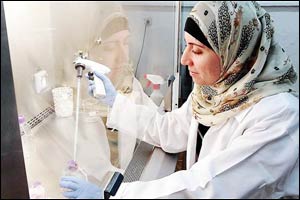
Dubai, March 20, 2014 –The L'Oréal-UNESCO For Women in Science 2014 Awards Ceremony was held at the Sorbonne in Paris on the evening of March 19th in honor of the five L'Oréal-UNESCOLaureates and fifteen International Fellows. Of the fifteen International Fellows, three were Arab women scientists, and we congratulateProfessor Alia Shatanawi of Jordan, Adila Elobeid of Sudan and Farah Ouechtati of Tunisia on being awarded this prestigious honor. Professor Günter Blobel, Nobel Prize in Medicine, presided over the ceremony, which was also attended by Irina Bokova, Director-General of UNESCO, and Jean-Paul Agon, Chairman and CEO ofL'Oréal and Chairman of the L'Oréal Foundation.
L'Oréal-UNESCO ‘For Women in Science'was founded in 1998 in the belief that the world needs science and science needs women. For the past sixteen years, the program has honored exceptional women scientists across the globe, whose outstanding achievements have contributed to the advancement of scientific knowledge and helped change the world for the better.
Every year the program awards Fellowships to promising young women researchers at the crucial points in their careers when stereotypes and pre-conceived notions can be most detrimental. Societal pressures leave women largely underrepresented in scientific professions. Across the world, fewer than one in three scientific researchers are female, and less than 3% of allNobel Prizes awarded in the sciences have been given to women.
Since 1998, the L'Oréal-UNESCO ‘For Women in Science' program has recognized over 2000 women scientists in 115 countries, two of whom later went on to win the Nobel Prize. These women are living proof thattalent and passion can overcome any obstacle.
In addition to the 230 local Fellowships awarded annually by L'Oréal subsidiaries around the world, the UNESCO-L'Oréal International Fellowship program was created in 2000 to encourage a select group of fifteen extraordinary International Fellows at doctoral or postdoctoral level by supporting their work for two years in prestigious institutions outside their home countries where they gain unique experience and build important networks.
This year, the Awards Jury in Life Sciences, presided over by Nobel Prize winner, Professor Gunter Blobel, and including the eminent Professor Lihadh Al-Gazali, Professor in Clinical Genetics and Pediatrics at the United Arab Emirates University, awarded three of these coveted Fellowships to incredible Arab women scientists.
Alia Shatanawi, Assistant Professor at the Department of Pharmacology, University of Jordan is awarded for her work unravelling the molecular mechanisms underlying the development of cardiovascular complicationsamong diabetes sufferers. She will be hosted in Georgia Regents University, USA, and on her return to the University of Jordan, Alia Shatanawi will train other researchers in these new techniques and work on a parallel project using samples from Jordanian diabetic patients. She explains that she is grateful for the opportunity, saying,“The number of women in science is increasing, but science is still a world dominated by men.”
Adila Elobeid, PhD studentat theSchool of Medicine, Ahfad University for Women, Sudanis awarded for her research into the process of neurodegeneration and her endeavors to raise awareness of brain donation in Sudan, a country where traditional beliefs make it difficult for families to accept post-mortem organ donations. She will be hosted at the Institute of Immunology, Genetics and PathologyatUppsala University, Sweden, where she will have the opportunity to observe first-hand how brain banks are established and managed. Upon completion of her doctorate Adila Elobeid plans to return to Sudan to continue teaching and researching and her goal is to set up the country's first brain bank. She says, “I think most women in science would agree that it is ever a challenge to be the best scientist one can be and, at the same time, the best daughter, sister and mother one can be. It is, however, a challenge I feel fortunate to be faced with.”
Farah Ouechtati,Postdoctoral researcher in Genetics at the Hédi Raïs Institute of Ophthalmology and theInstitutePasteur in Tunisia will be hosted at the Department of Genetics, Institute of Vision, Paris, France and is awarded for her research into the genetic basis of eye diseases and more specifically inherited retinal diseases, by studying the gene, Nxn12, which may also play a role in Alzheimer's disease. She says, “Inspiring science teachers are key to bringing more students into the profession, teachers that help you learn to think critically and ask the right questions.”
These impressive Arab women International Fellows have shown outstanding potential in the areas of neurobiology, human diseases, and genetics and have already contributed to the creation of innovative solutions in their fields. Within our region, and within the international scientific community as a whole, these exceptional women are a source of inspiration for future generations. We must congratulate these beacons of female scientific achievement.
|
